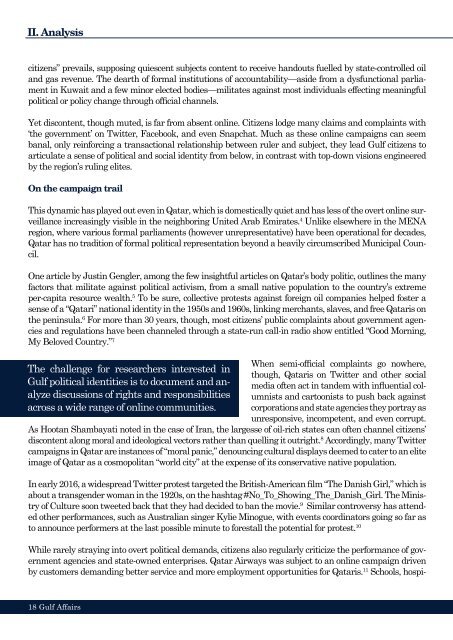You also want an ePaper? Increase the reach of your titles
YUMPU automatically turns print PDFs into web optimized ePapers that Google loves.
II. Analysis<br />
citizens” prevails, supposing quiescent subjects content to receive handouts fuelled by state-controlled oil<br />
and gas revenue. The dearth of formal institutions of accountability—aside from a dysfunctional parliament<br />
in Kuwait and a few minor elected bodies—militates against most individuals effecting meaningful<br />
political or policy change through official channels.<br />
Yet discontent, though muted, is far from absent online. Citizens lodge many claims and complaints with<br />
‘the government’ on Twitter, Facebook, and even Snapchat. Much as these online campaigns can seem<br />
banal, only reinforcing a transactional relationship between ruler and subject, they lead Gulf citizens to<br />
articulate a sense of political and social identity from below, in contrast with top-down visions engineered<br />
by the region’s ruling elites.<br />
On the campaign trail<br />
This dynamic has played out even in Qatar, which is domestically quiet and has less of the overt online surveillance<br />
increasingly visible in the neighboring United Arab Emirates. 4 Unlike elsewhere in the MENA<br />
region, where various formal parliaments (however unrepresentative) have been operational for decades,<br />
Qatar has no tradition of formal political representation beyond a heavily circumscribed Municipal Council.<br />
One article by Justin Gengler, among the few insightful articles on Qatar’s body politic, outlines the many<br />
factors that militate against political activism, from a small native population to the country’s extreme<br />
per-capita resource wealth. 5 To be sure, collective protests against foreign oil companies helped foster a<br />
sense of a “Qatari” national identity in the 1950s and 1960s, linking merchants, slaves, and free Qataris on<br />
the peninsula. 6 For more than 30 years, though, most citizens’ public complaints about government agencies<br />
and regulations have been channeled through a state-run call-in radio show entitled “Good Morning,<br />
My Beloved Country.” 7<br />
The challenge for researchers interested in<br />
Gulf political identities is to document and analyze<br />
discussions of rights and responsibilities<br />
across a wide range of online communities.<br />
When semi-official complaints go nowhere,<br />
though, Qataris on Twitter and other social<br />
media often act in tandem with influential columnists<br />
and cartoonists to push back against<br />
corporations and state agencies they portray as<br />
unresponsive, incompetent, and even corrupt.<br />
As Hootan Shambayati noted in the case of Iran, the largesse of oil-rich states can often channel citizens’<br />
discontent along moral and ideological vectors rather than quelling it outright. 8 Accordingly, many Twitter<br />
campaigns in Qatar are instances of “moral panic,” denouncing cultural displays deemed to cater to an elite<br />
image of Qatar as a cosmopolitan “world city” at the expense of its conservative native population.<br />
In early 2016, a widespread Twitter protest targeted the British-American film “The Danish Girl,” which is<br />
about a transgender woman in the 1920s, on the hashtag #No_To_Showing_The_Danish_Girl. The Ministry<br />
of <strong>Culture</strong> soon tweeted back that they had decided to ban the movie. 9 Similar controversy has attended<br />
other performances, such as Australian singer Kylie Minogue, with events coordinators going so far as<br />
to announce performers at the last possible minute to forestall the potential for protest. 10<br />
While rarely straying into overt political demands, citizens also regularly criticize the performance of government<br />
agencies and state-owned enterprises. Qatar Airways was subject to an online campaign driven<br />
by customers demanding better service and more employment opportunities for Qataris. 11 Schools, hospi-<br />
18 Gulf Affairs


